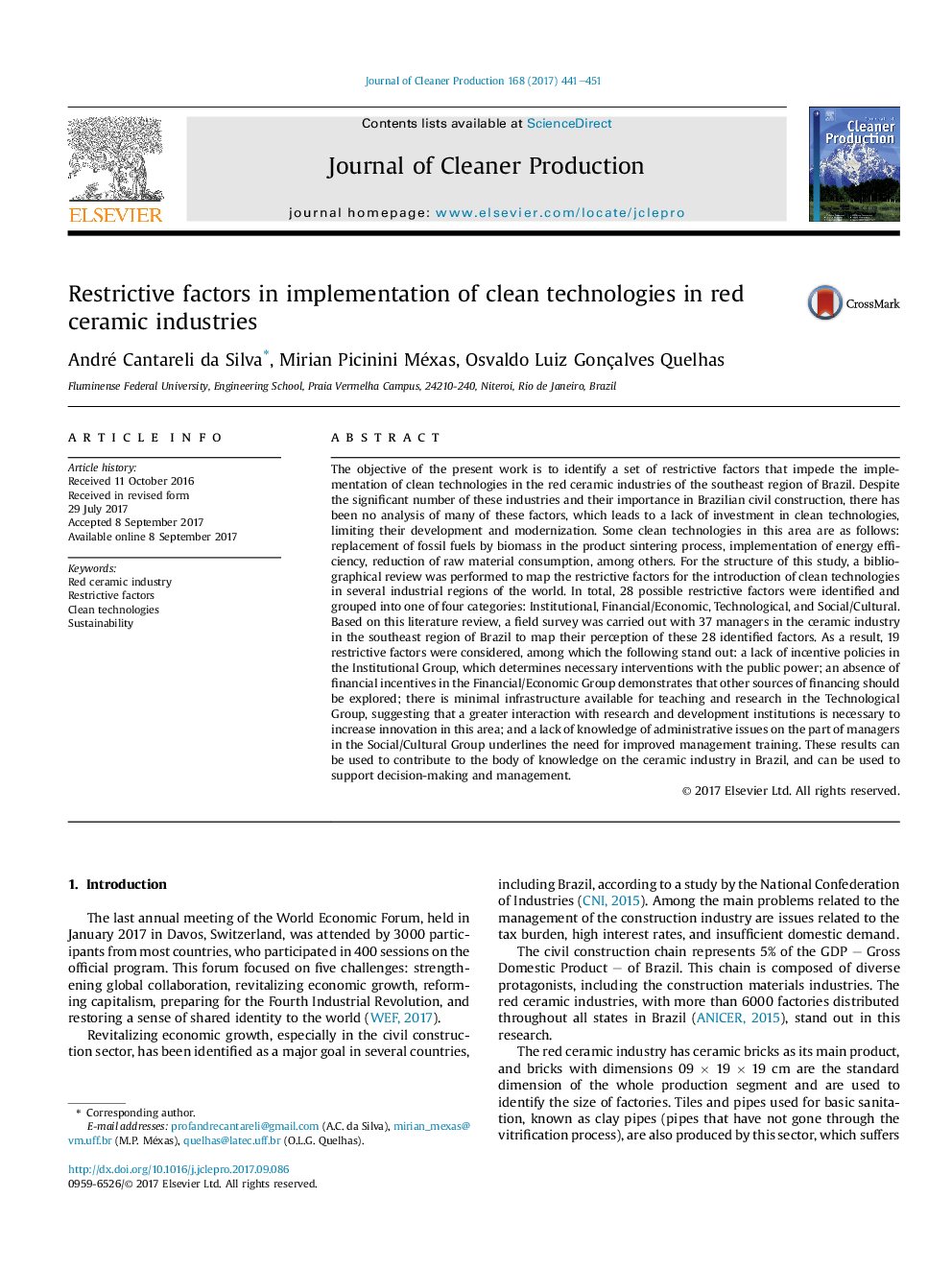ترجمه فارسی عنوان مقاله
عوامل محدود کننده در اجرای فن آوری های پاک در صنایع سرامیک قرمز
عنوان انگلیسی
Restrictive factors in implementation of clean technologies in red ceramic industries
| کد مقاله | سال انتشار | تعداد صفحات مقاله انگلیسی |
|---|---|---|
| 105065 | 2017 | 11 صفحه PDF |
منبع

Publisher : Elsevier - Science Direct (الزویر - ساینس دایرکت)
Journal : Journal of Cleaner Production, Volume 168, 1 December 2017, Pages 441-451
ترجمه کلمات کلیدی
صنعت سرامیک سرخ، عوامل محدود کننده، فن آوری های پاک، پایداری،
کلمات کلیدی انگلیسی
Red ceramic industry; Restrictive factors; Clean technologies; Sustainability;
ترجمه چکیده
هدف از کار حاضر شناسایی مجموعه ای از عوامل محدود کننده ای است که مانع از اجرای فن آوری های پاک در صنایع سرامیک قرمز منطقه جنوب شرقی برزیل می شود. علیرغم تعداد قابل توجهی از این صنایع و اهمیت آنها در ساخت و ساز شهری برزیل، هیچ کدام از این عوامل تجزیه و تحلیل نشده است، که منجر به عدم سرمایه گذاری در فن آوری های تمیز، محدود کردن توسعه و نوسازی آنها می شود. برخی از فن آوری های تمیز در این زمینه عبارتند از: جایگزینی سوخت های فسیلی با استفاده از زیست توده در فرآیند پخت، زمان استفاده از انرژی، کاهش مصرف مواد اولیه و غیره. برای ساخت این مطالعه، یک مرور کتابشناختی برای نقشه برداری از عوامل محدود کننده برای معرفی فن آوری های پاک در چندین منطقه صنعتی جهان انجام شد. در کل، 28 عامل مهار کننده احتمالی شناسایی شدند و به یکی از چهار طبقه بندی تقسیم شدند: نهادی، مالی، اقتصادی، تکنولوژیکی و اجتماعی / فرهنگی. بر اساس این بررسی ادبیات، با 37 مدیر صنعت سرامیک در منطقه جنوب شرقی برزیل به منظور بررسی ادراک آنها از این 28 مورد شناسایی شده، یک نظرسنجی انجام شد. در نتیجه 19 فاکتور محدود کننده در نظر گرفته شد که از جمله موارد زیر است: فقدان سیاست های انگیزشی در گروه نهادی که مداخلات لازم را با قدرت عمومی تعیین می کند؛ فقدان مشوق های مالی در گروه مالی / اقتصادی نشان می دهد که منابع مالی دیگر باید مورد بررسی قرار گیرد؛ کمترین زیرساخت موجود برای تدریس و تحقیق در گروه تکنولوژیکی وجود دارد، که نشان می دهد که تعاملات بیشتر با موسسات تحقیق و توسعه برای افزایش نوآوری در این زمینه ضروری است؛ و عدم شناخت مسائل اداری از سوی مدیران گروه اجتماعی / فرهنگی، نیازمند آموزش پیشرفته مدیریتی است. این نتایج می تواند برای کمک به دانش در صنعت سرامیک در برزیل مورد استفاده قرار گیرد و می تواند برای حمایت از تصمیم گیری و مدیریت استفاده شود.

